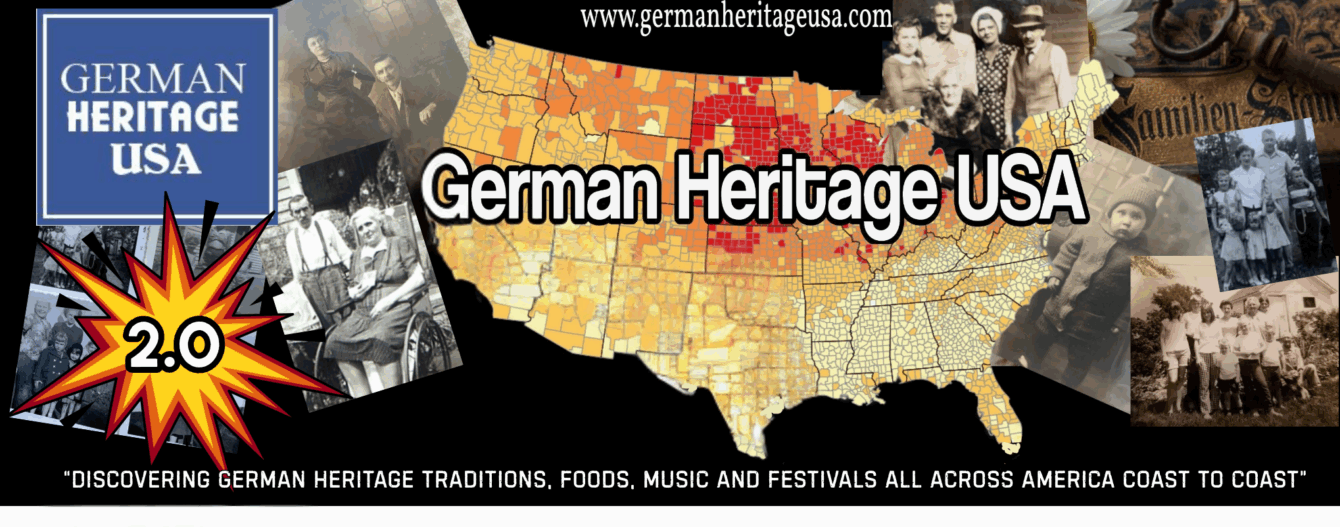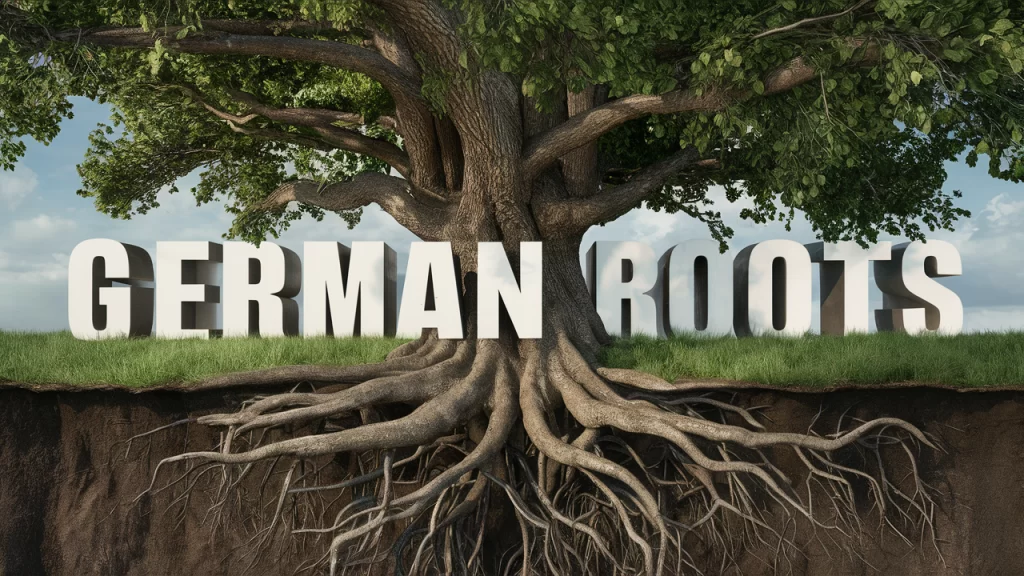Embracing German-American Family Names: Uncovering the Stories Behind Them
GERMAN HERITAGE USA | AFFILIATE DISCLAIMER: This post may or may not contain affiliate links which means we may receive a commission for purchases made through links. We will only recommend products that we have personally used or that we truly trust. Learn more on our Private Policy and Disclaimer Page located under our Terms Of Service tab above.
In American history, German-American family names are like threads in a colorful tapestry. They carry rich stories and deep cultural roots. Exploring these names brings to light a legacy that influenced not just the lives of many but also America itself.1

This article takes you on a journey from the first German immigrants through to today. We will look at what these names mean and where they come from. This helps us understand the strength, successes, and ongoing impact of German-Americans.2
- Discover the captivating tales behind German-American family names and the rich cultural heritage they represent.
- Explore the history of German immigration to the United States and the lasting impact of German culture on American society.
- Uncover the significance of family names, particularly those with German origins, and the stories and histories behind them.
- Learn about the diversity and prevalence of German-American family names and the cultural influences that have shaped them over time.
- Delve into the process of uncovering one’s ancestral roots, including genealogical research methods and DNA testing for German ancestry.
Tracing German Heritage in America
Generations of German immigrants have shaped America’s culture, social life, and economy. Their influence started with colonial settlers and grew with 19th-century immigrants.3
The Arrival of German Immigrants
German immigrants came from places like Württemberg, Pfalz, Saxony, and Westphalia. The Pennsylvania Dutch were among the first, arriving in the 18th century. Around 65,000 came to North America from 1727 to 1775.3 The 19th century saw a huge wave, with over 7 million Germans arriving. This period marked one of the largest immigrant movements in America’s history.3

They left Germany for various reasons, including political issues, poverty, and religious freedom. As they settled, they shared their culture, shaping American society.3
The Influence of German Culture on American Society
German culture is deeply ingrained in America, seen in its literature, art, and more. From Oktoberfest to beloved German foods, their traditions enrich American culture.3
German-Americans also had a big impact on science, tech, and the economy. Famous names such as Albert Einstein and Henry J. Heinz highlight this influence.3
Today, German heritage is a key part of American culture. The stories of German immigrants and their descendants remind us of America’s diverse fabric.
The Significance of Family Names
Family names are more than just words. They connect us to our past and culture. For German-Americans, these names tell meaningful tales. Since the 1100s, German surnames have been doing just that, sharing stories from different sources. These sources include names based on parents’ names, what people did for a living, how they looked, and even where they lived.4
The Meaning and Origins of Common German-American Names
German Heritage can be easily spotted in names that have special sounds. For example, if a name starts with Kn or Sch, it’s likely German. Names like Müller, Schmidt, and Schneider are very common. They hint at jobs people once had, like millers or blacksmiths.4

5 Dr. George F. Jones looked at 12,700 German names in his book. He showed how these names really mean something. Some names even show the first owners of certain lands. Others tell us something special about the place they come from.5
Preserving Family Traditions and Values
German-American families have kept their culture alive over the years. This is clear in their surnames. About 80% come from jobs people did. This rich tradition has helped keep families connected to their heritage.
Even when names had to change a bit, the essence remained. Challenges like making names easier to say or spell haven’t stopped these families. They’ve kept up their traditions. For instance, longer names were sometimes made shorter. Messerschmidt might become Messersmith or Apfelbaum to Applebaum.6
This shows the strength of German-American families. They have upheld their unique culture through such changes. By doing so, they’ve ensured their family names hold importance across the generations.
German-American Family Names
The rich tapestry of [german-american family names] shows the strong impact German immigrants had in the U.S. These names have diverse origins, telling unique stories of German-Americans. They reflect the history and culture of German immigrants.7
[German-American family names] often show what jobs people did. For example, you might find names like Müller (miller) and Fischer (fisher). Müller means someone’s ancestor might have been a miller. Other names, like Weber (weaver), show they worked as such.7
Their names can tell us more than just jobs. Last names like Meyer (land steward) and Bauer (farmer) hint at their social and economic roles. There are names like Richter (judge) too, showing some might have been leaders in their community.7
[German-American family names] can also be about looks or nature. Braun (brown) and Schwarz (black) are examples. Names like Fuchs (fox) and Vogel (bird) connect to nature, giving hints about their traditions.7
Names also show where someone might come from. Frank means they could be from Franconia. Schumacher (cobbler) and Goldschmidt (goldsmith) show what they did for a living. So, these names carry a lot of history and meaning.7
The names have changed over time in the U.S. German immigrants and their kids adapted, sometimes altering their names. But some still use the original spellings and pronunciations. They do this to hold onto their cultural roots.8
The variety and abundance of [german-american family names] highlight the deep effect of German immigration on the U.S. These names are a tribute to German-American families. They show the strength and change these families brought to America.
Tracing your German-American heritage is fascinating. It’s a journey that can be quite rewarding. You get to unlock stories that make up your family’s identity. There are many genealogical research methods to help you do this. These range from exploring historical records to using the power of DNA testing.
Genealogical Research Methods
To start, you should look into historical records. This includes census data and church documents. You can also check passenger lists from when your ancestors first arrived. Family archives can be a huge help as well. They give clues to your ancestors’ lives and how they came to America.9 Remember to use alternate spellings and maiden names. This is key because German surname spelling can vary a lot.
You can also find help in records like the Hamburg passenger lists and German phone directories. Military records and Jewish Family History Collection are also useful. They can help a lot with your genealogical research. Don’t forget online message boards and family trees. They might link you with long-lost relatives. These connections can offer insights and open up new leads to follow.
DNA Testing for German Ancestry
DNA testing is a new and powerful way to learn about your German roots. By studying your genes, these tests show your ethnic background and geographic origins. This is very useful for finding your German roots in America.10 It can tell you the specific areas in Germany your family came from.
These tests also help find relatives you didn’t know about. You can use this to grow your family tree. It can reveal more about your German-American history than you thought possible.10 Working with these newfound relatives can be very enriching. You get to share stories and learn more about your shared German-American history.
Whether you’re digging through old records or using DNA tests, finding your German-American roots is an enlightening and rewarding journey. By using these genealogical research tools, you can discover more about your family’s story. It lets you celebrate the strong heritage of your German-American roots.
Stories of German-American Families
The tales of German-American families highlight resilience and perseverance. They have greatly influenced American society. These stories show how they overcame challenges, leaving their mark on many parts of American life.
Overcoming Challenges and Adversity
German-American families faced and overcame a lot. Their strength and determination helped them tackle obstacles and grow. The Weckerlein family, for example, has navigated ten years of marriage in a new country. Julie served nine years in the US Air Force11. Her husband, Martin, embraced life in the United States for seven years11. Together, they have three children and enjoy their pets11.
The Altmanns’ story follows several generations through tough times, including wars and economic hardships.12 Their family’s resilient spirit comes from their German roots. Even with over a century in America, they still honor where they came from.
Contributions to American Society
Besides facing adversity, German-Americans have greatly contributed to American life. Julie’s hard work, seen in her daily commute to D.C., showcases this dedication11. The Altmann family’s work in farming and lumber shows their deep relationship with the land12.
Their influence is also seen in preserving cultural aspects. For example, the Weckerleins keep their New Year’s traditions in Paris, and the Jung Seed Company honors its heritage118. These actions connect their past with their present in a rich way.
American culture is like a vibrant quilt, made with different heritages and traditions. German-American families, for instance, find joy in their unique background.13 It’s not just about remembering their past. It’s also about sharing and learning within their community.
The story of a German-American family shows how they blend cultures. They bring together diverse traditions, languages, and beliefs.13 This mingling shapes who they are, offering a unique view of being a part of America.13
The Importance of Celebrating Heritage
Celebrating German-American heritage adds to the beauty of America’s many cultures.13 This celebration links the past with the present. It helps keep their legacy alive, showing their important part in America’s story.
This celebration also brings people closer. It joins those from different backgrounds to share their stories and customs.14 Through this, a richer, more accepting American identity is built. It breaks down old ideas and welcomes everyone into the American family.14

Preserving German Traditions
German-American communities across the U.S. work hard to keep their cultural traditions alive15. They focus on things like language and food, as well as special days and parties. These customs are key in connecting families and showing pride in their German roots.
Language and Cuisine
Many families in these communities still speak German and use special nicknames, known as Kurzformen15. This keeps their culture strong and helps kids learn about their heritage. It’s their way of passing stories and love for their language to the next generation.
Food is a big part of this, too. Traditional dishes like bratwurst and schnitzel are loved by everyone. They link German-Americans with their past and are also popular with other Americans.
Festivals and Celebrations
Not forgetting the fun part, German-Americans celebrate their heritage in big ways. They have events like Oktoberfest and Christmas markets. These gatherings are not just events; they are times to learn and have fun together.
These celebrations are also a chance for other Americans to join in. They learn more about German culture and enjoy the traditions. This sharing helps everyone feel closer together in the U.S.
The efforts of German-American communities keep their customs alive today1516. These old traditions in language, food, and celebrations tell a story of strength. They show that the German-American way will not be forgotten, passing down a rich legacy to the future.
The Legacy of German-American Families
German-American families have left a deep impact on America. They started the first kindergarten in Wisconsin in 185517. They also gave us the Christmas tree and Easter bunny17. These are just a few examples of how their culture is part of American history.
They shaped values and identities in each new generation. By sharing family stories with their kids and grandkids, they kept their heritage alive18.
Today, keeping family tales alive is very important. It connects youth with their past and makes them feel proud. Celebrating their culture, German-American families are leaving a significant mark on the nation.
[Legacy german-american families] are still very much a part of America. They remind us how immigrants have enriched our country. By sharing their stories, they promise to keep their culture alive for the future.
Resources for Exploring German-American Heritage
Exploring your German-American roots? Online databases, archives, and local groups can help a lot. They offer many tools for you to learn more about your family.19
Online Databases and Archives
Want to discover your German roots? Ancestry.com is a great place to start. It has over 27 billion records and 100 million family trees.19 You’ll find millions of historical documents and images there. Ancestry’s U.S. Immigration Collections can tell you about your German ancestors’ journeys to America.19 But, access to these records might need a subscription.19
The Immigrant Ships Transcribers Guild and the database at Castle Garden are also helpful. They track the travels of German immigrants in the 1800s.19 If your ancestors came through New York, the Statue of Liberty—Ellis Island Foundation, Inc. offers a free search for their arrival records from 1820 to 1957.19
Interested in all 400 years of German migration to North America? The German Emigration Center has researched this history up to 2000.19 It’s a great resource for getting a full picture of German-American history.
Local German-American Associations
Local groups across the U.S. are dedicated to keeping the German-American heritage alive. These provide chances for connecting and learning together. For example, the American/Schleswig-Holstein Heritage Society is focused on the region’s history.20
In Davenport, the Schuetzen Park is a 20-acre area perfect for nature walks and events. It’s open May through November.20
The German American National Congress celebrates German culture in America. And the Max Kade Institute at the University of Wisconsin–Madison studies German-American stories. It shows their impact on the world through centuries of migration.20
Another key place is the DANK Haus. It works hard to keep German culture alive. They do this by offering educational and fun events that focus on German and German American history.20
Conclusion
In wrapping up our look at German-American family names, we see their deep importance. These names tell the story of the vibrant culture German-Americans bring to the U.S. They share the legacies, traditions, and stories that families have shared over time.21
We explored German heritage in the USA‘s journey through the years. Immigrants have helped shape America’s spirit with their customs. We learned about names that carry strong religious and personal meanings.18 Additionally, German-American families work hard to keep their traditions and food alive. This keeps their heritage part of the American story.21
As you start looking into your German ancestry and family name, dive in. Discover the stories of your family and where you come from. Make sure future generations know about your German-American heritage.18 This way, you celebrate the past and keep German-American culture strong in the U.S.21
FAQ
What is the significance of German-American family names?
German-American family names are more than just labels. They tell stories of rich cultural heritage. They are a living connection to the journeys and achievements of German immigrants in the U.S.
How have German immigrants shaped the cultural fabric of the United States?
German immigrants have deeply influenced American life. They’ve added to art, literature, and politics. Their cultural input has shaped the United States for centuries.
What are some common German-American surnames and their origins?
Names like Mueller, Schneider, and Hoffman have deep roots. They show us where German-American families come from. Looking into these names reveals individual family histories and German-American legacies.
How can individuals uncover their German-American ancestral roots?
Those curious about their German-American roots can use many methods. They can search in historical records and family documents. DNA tests also offer clues to one’s German ancestry.
What are some challenges and triumphs experienced by German-American families?
German-American families have overcome much. They’ve tackled tough times and worked to fit into U.S. culture. Yet, their success stories highlight their resilience and give to the American story.
How do German-American communities work to preserve their cultural traditions?
German-American communities work hard to keep their culture alive. They cherish their language and food. Festivals and other events are key in passing down traditions to future generations.
What resources are available for exploring German-American heritage?
A lot of resources exist for tracing one’s German-American past. Online databases, historical archives, and local groups are a great start. They offer chances to learn and get involved in preserving cultural heritage.
Source Links
- https://andrekearns.medium.com/bryant-gumbels-german-ancestry-and-mine-da1e095b69c6
- https://scua.library.uni.edu/university-archives/historical-information-and-essays/kaltenbachs-solid-american-family-shadow
- https://familylocket.com/part-1-tracing-your-19th-century-german-ancestors-which-germans/
- https://www.thoughtco.com/german-surnames-meanings-and-origins-1420789
- https://newbremenhistory.org/en/content/11-german-surnames-their-meaning-origin
- https://www.germanmarylanders.org/miscellaneous-a-to-z/family-name-changes
- https://www.thoughtco.com/german-last-names-1444607
- https://loyolanotredamelib.org/php/report05/articles/pdfs/Report43Eichhoff23-36.pdf
- https://support.ancestry.com/articles/en_US/Support_Site/Finding-German-Ancestors
- https://familylocket.com/part-3-tracing-your-19th-century-german-ancestors-tips-for-getting-the-surname-right/
- https://pocketcultures.com/2012/07/05/a-german-american-family-in-the-usa/
- https://www.uwlax.edu/globalassets/offices-services/urc/jur-online/pdf/2002/t_richardson.pdf
- https://hubpages.com/education/Embracing-cultural-heritage
- http://culturesconnecting.blogspot.com/2013/08/understanding-and-embracing-cultural.html
- https://familytreemagazine.com/names/first-names/german-naming-traditions/
- https://www.familysearch.org/en/wiki/Germany_Naming_Customs
- https://www.loc.gov/classroom-materials/immigration/german/building-institutions-shaping-tastes/
- https://en.wikipedia.org/wiki/German_Americans
- https://www.germany.travel/en/campaign/german-heritage/heritage.html
- https://gahc.org/resources/
- https://www.scchgs.org/documents/meetinghandouts/German_Naming.pdf


